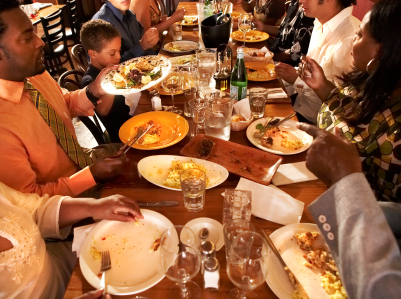When you’re a new vegetarian you may find that your co-workers, family and friends are a problem. They can overwhelm you with a lot of questions and comments. Some may give you a lot of grief. They may tease you and try to entice you to eat what they were used to you eating before you made your commitment to change your diet. I once had someone tell me I might as well get a white boyfriend because I wouldn’t be able to find a black vegetarian man!
So, how can you stay focused and on target with your diet goals while still staying connected to your family and loved ones and friends?
Tip #1 – Get clear in your mind about why you are doing this. Why are you deciding to become vegetarian? Is it for your health? Is it for the sake of the environment or for your concern about the animals? Or maybe it’s all three. Be clear in your mind about why you are becoming a vegetarian or vegan. Research and get data by watching videos and reading books about vegetarian and veganism. Go online and read blogs and fill your brain and your mind with all the information you need so that there’s no question your mind that what you were doing is the right thing for you. Education is your friend here. Look in the sidebar for my recommendations of books and videos that I have found to be very helpful. Also check at the end of the post for my blog and website recommendations.
Tip #2 – Do some role-playing. Write down the questions that you have heard already. Think about what questions you may hear from people. Plan what you will say the next time you hear those questions. Ask a supportive friend or family member to play the role of the antagonist or question asker. Practice saying what you want to be able to say the next time.
Tip #3 – Think about the situations that you are in on a daily basis. Consider what activities you have planned. Are you traveling? Are you going to a family gathering? Who will be there? Who will or do you interact with? What is likely to be a problem area or situation.
Tip #4– Identify who is a support for you. Who is an ally for you that you can count on to be there to have your back? Contact this person and tell them your concerns. Let them know that you need someone who will have your back. Find out how they think they can help. Talk to them about your concerns. It will be comforting to know who you can turn to if you need someone to talk to or if you need someone who will stick up for you.
Tip #5 – Figure out who is likely to be what I like to call your “Uncle Ruckus” – the person that’s most likely to give you grief or to tease you and make you feel bad about what you’re doing. Who is the person that you’re feeling uncomfortable about, feeling uneasy about coming in contact with. Get clear in about what you think they will say or do. What have they said to you in the past? Role-play how it is you will respond to them the next time. Ask your ally to role play with you. Write down your responses. Ask a vegetarian friend how they respond and what kinds of questions or problems they have had.
Tip #6 – Be careful that you don’t become seen as the “vegetarian police.” I know it’s tempting to tell everyone all about your new found health and diet. You care about these people and you want them to get the same benefits that you’re getting and feel like you’re feeling. BUT! They don’t really want to hear about it. So bite your tongue. Just be a shining example and soon earlier some of them may come to you and ask more information.
Tip #7 – Avoid talking about your diet at meals. Of course this is when people will try to talk to you. “Why aren’t you eating chicken wings anymore?” “What you’re too good for chicken wings?” They want to question you and ask about what it is you doing and why.
Dr. Opare always says you should just respond that “I would be happy to talk to you about it but not over the meal. Ask me again later and I’ll tell you about it.” Chances are real good that they won’t bother to come back to you. Most don’t really want to know. If they are really interested then they will come follow up with you. This will save you much tension and defensiveness over your meal. I learned that lesson the hard way when I ended up in tears one holiday meal.
Tip #8– Be patient. When you are a new vegetarian it is new to your friends, family and co-workers too. Before too long you and your “weird” diet will become old hat and they won’t bother you about it. In fact they may start eating better themselves as they begin to include more healthy food in the menu to accommodate you, or they learn to enjoy the healthier options that YOU bring to add to the menu.

So hopefully if you follow these tips you will find that your transition and dealing with other people will be easier. Stick to your guns don’t give up.
This is Pillar #4 of the Four Pillars Of Success – Real World Navigation Skills. To learn more about the Four Pillars and how to master them check out our Pamoja! membership program.
Helpful webpages and blogs.
Physicians Committee For Responsible Medicine

A library of courses to show you how to make delicious healthy meals, deal with your cravings, feel confident about what you are eating, and navigate the non-vegan world you live in.

